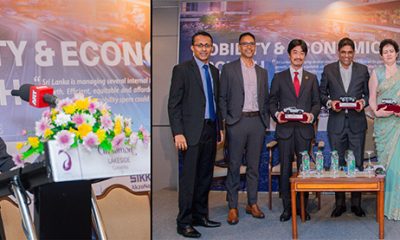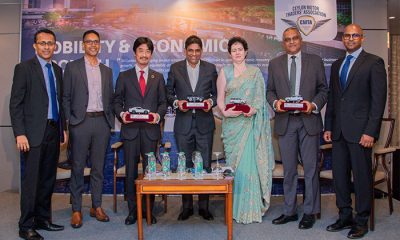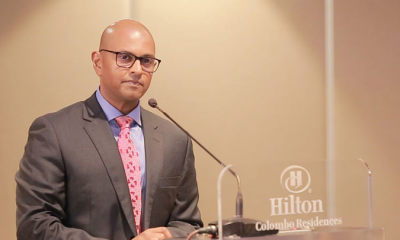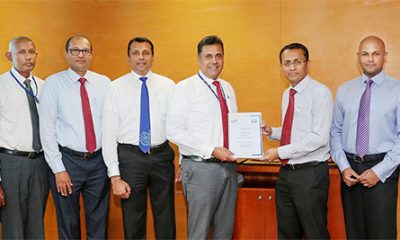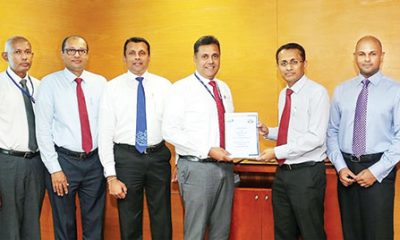Business
Need for manufacturer-authorized brand new EVs stressed

A key factor that needs to be borne in mind when introducing electric vehicles (EV) to Sri Lanka is the need to allow only manufacturer authorized brand-new vehicles of this kind into the country, it was revealed at a recent forum organized by the Ceylon Motor Traders Association (CMTA) and the Association of International Marketing Graduates in Sri Lanka (AIMG). The event which was titled ‘Road to Electrification’ was held at the Jetwing Colombo.
A press release said: ‘The joint forum was participated in by over 100 automotive industry experts, marketers, corporate leaders, executives, and professionals and was aimed at initiating productive discussion within the community and imparting knowledge on the introduction of EV to the Sri Lankan market and its impact on the economy of Sri Lanka.
‘The speakers at the event included Dr. Harsha Subasinghe, founder of VEGA, the first electric super car made in Sri Lanka; Dr. Niles Perera, logistics specialist from the University of Moratuwa; Ms. Maricor Muzones, regional program development lead for GGGI; and Lalith De Alwis, additional secretary for the Ministry of Transport and Highways. Yasendra Amerasinghe, immediate past Chairman of CMTA and CEO of Carmart (Pvt) Ltd, served as the moderator.
‘A vibrant and thought-provoking panel discussion took place, with the speakers sharing their knowledge of technical expertise, environmental protection, and regulatory policy development requirements to embrace the EV age. While both the pros & cons of the EV rollout was well highlighted, one key factor which was established was the need to strongly regulate the EV eco-system and for the need to allow only manufacturer authorized brand-new electric vehicles to the country.
‘In his introduction, Dr. Subasinghe stated that “the future for electrically powered vehicles is very bright” and delved into the benefits and issues of EVs that we need to overcome. He further stressed the importance of charging networks and the exportation of charges to other countries, and he shared his wealth of experience on batteries, controllers, etc. Speaking in terms of electricity generation, Dr. Subasinghe delved into SMR (small modular reactor) systems and the possibility of Sri Lanka adapting them.
‘Ms. Maricor Muzones spoke on GGGI, which is a treaty-based organization operating to get the principle of green growth in Sri Lanka. In her opinion, “Sri Lanka has put in many development policies, out of which the transport policy is now being reviewed for strengthening.” Although the mandate is available, how it should be operationalized is the question. “GGGI is looking at supporting the government and there should be an operational plan’. GGGI’s role is to support the government of Sri Lanka; however, Muzones believes the involvement of the private sector is vital.
‘De Alwis, as a Sri Lanka Government representative, stated, “Transport is the key factor to the economy, and there are guidelines being prepared for EV vehicles with the support of the UNDP.” De Alwis also spoke on the financial issues and the national transport action plan that is being prepared, including e-mobility, technology, environmental protection, infrastructure, etc. Concluding, De Alwis spoke on the policy changes needed and highlighted the important factors relating to the awareness of EV.’ He also stated that by 2030, there will be an action plan in place to develop renewable energy sources up to 70%, and he asked for private sector participation in this effort.
‘Dr. Niles stated that in transportation there is a lot of movement toward sustainable transportation, mentioning that EV is the fastest developing technology. The aim should be to move faster with better sustainable resources, and in order to do that, it is important to look at the supply chains for electric vehicles, such as mining and so on. He also stated that “there should be a plan to train people, provide charging stations, and build other infrastructure to support electric mobility.” Converting the existing fleet to electric vehicles is not feasible. For the transition, a new fleet of electric vehicles should be brought in, and in terms of energy, his point was to ensure Sri Lanka’s energy security while putting the required regulations and infra-structure in place.
‘The event concluded with a question-and-answer session. The corporate partners of CMTA and AIMG are SLIC, HNB Leasing, SLT-Mobitel, Sampath Bank & Emerging Media.’
Business
Lanka’s largest solar park set to transform energy landscape and local economy in Hambantota
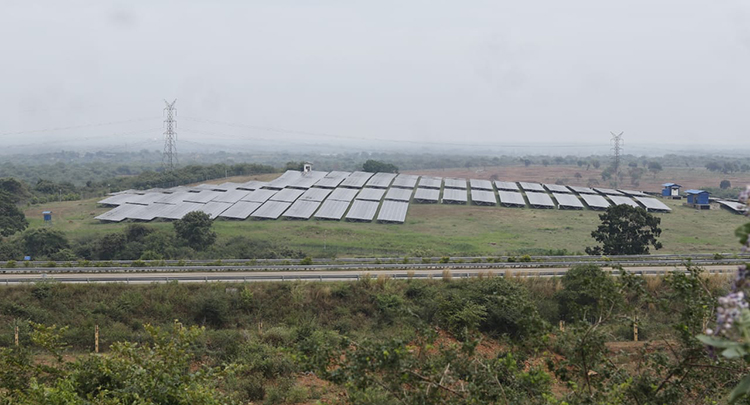
A new era in Sri Lanka’s renewable energy is unfolding in the Gonnoruwa Division of Hambantota District, where construction has begun on the country’s largest solar power park. Spanning 450 acres and designed to generate 150 megawatts (MW) of electricity, the US$150 million private-sector-led project is poised to become a cornerstone of the nation’s sustainable energy ambitions.
Officials say the solar park, guided by the Sustainable Energy Authority and the Mahaweli Authority, will make its first contribution to the national grid by the end of this year, with full capacity expected by 2026. Once completed, the facility will rank among Sri Lanka’s largest renewable energy installations, second only to the 210 MW Victoria Dam and the 150 MW Upper Kotmale hydropower project.
The initiative is being framed as a strategic response to recurring power cuts in the Southern Province during annual drought periods. With a projected 20% contribution to the country’s daytime electricity demand, the solar park is expected to significantly stabilize the grid, reduce reliance on fossil fuels, and contribute to the country’s renewable energy targets.
Project Engineer Thilanka Bandara confirmed that preliminary land preparation and boundary works have been completed, with 50 MW already feeding into the national grid. The investment, fully funded through foreign direct investment, local bank loans, and equity capital, requires no government funding. Two private firms are sharing the development, contributing 70 MW and 80 MW respectively.
Bandara highlighted a unique feature of the project: the transmission infrastructure, estimated at US$16 million, is entirely financed by the investors, marking a departure from conventional grid-connected projects. The park will also employ state-of-the-art ground-mounted solar technology, considered the most advanced currently deployed in Sri Lanka.
In a first for Sri Lanka, the solar panels will be installed five feet above the ground, allowing partial-shade crops to be cultivated underneath. Technical Officer Sithmina Bandara explained that this setup will enable the cultivation of food plants such as mushrooms, which thrive in shaded conditions, creating a model for integrated solar-agriculture systems. Agricultural experts have already provided guidance on implementing this initiative, which combines energy production with local food security.
The project is expected to generate 750 to 1,000 direct and indirect jobs, with 400–500 already employed in the initial phase. Long-term maintenance work will provide further employment opportunities, offering a substantial economic boost to the Hambantota region. Environmental management measures are also in place to prevent elephants from entering nearby villages, ensuring harmony between development and wildlife.
All necessary approvals and permits were obtained by February 2025, aligning the project with the Ceylon Electricity Board’s national generation plan. Officials confirmed that upon completion, the total output of the Solar Energy Park will rise to 200 MW, combining existing installations with the new 150 MW facility.
Experts say the Hambantota solar park represents more than just a power generation project. Its innovative design, private-sector financing, and integrated agricultural approach position it as a template for future renewable energy projects in Sri Lanka, reflecting a new model of sustainable development that balances energy, economy, and environment.
By Sirimanta Ratnasekera
Business
ESU Kandy clinches dominant victory at ‘Battle of Esoftians’
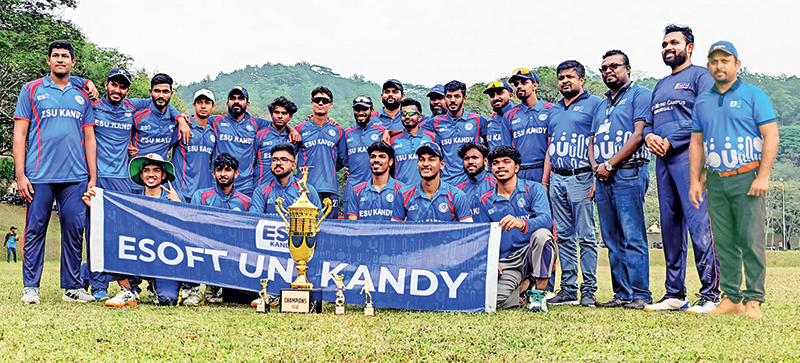
The Battle of Esoftians, an annual cricket encounter organized by ESOFT Uni Kandy, concluded with a spectacular display of cricketing prowess as the Kandy team secured a massive 245-run victory over ESOFT Metro Campus, Kurunegala. The match was held on the 15th at the University of Peradeniya Grounds.
Winning the toss and electing to bat first, the ESOFT Uni Kandy batsmen dominated the field from the outset. They showcased an explosive batting performance, posting a formidable total of 280 runs for the loss of 5 wickets in their allotted 20 overs.
In response, the Kurunegala ESOFT Metro team struggled against a disciplined bowling attack. The Kandy bowlers dismantled the opposition’s batting lineup, bowling them all out for a mere 35 runs, sealing a historic win for the Kandy campus.
The event was graced by the presence of key officials from the ESOFT management: Amila Bandara – Chief Operating Officer (ESOFT Uni), Dimuthu Thammitage – General Manager (Central Region), Lakpriya Weerasinghe – Deputy General Manager, ?Lahiru Diyalagoda
Centre Manager-Degree Division, ESOFT Metro Campus Kurunegala and Dushantha Sandaruwan – Master in Charge (ESU Kandy Cricket Club)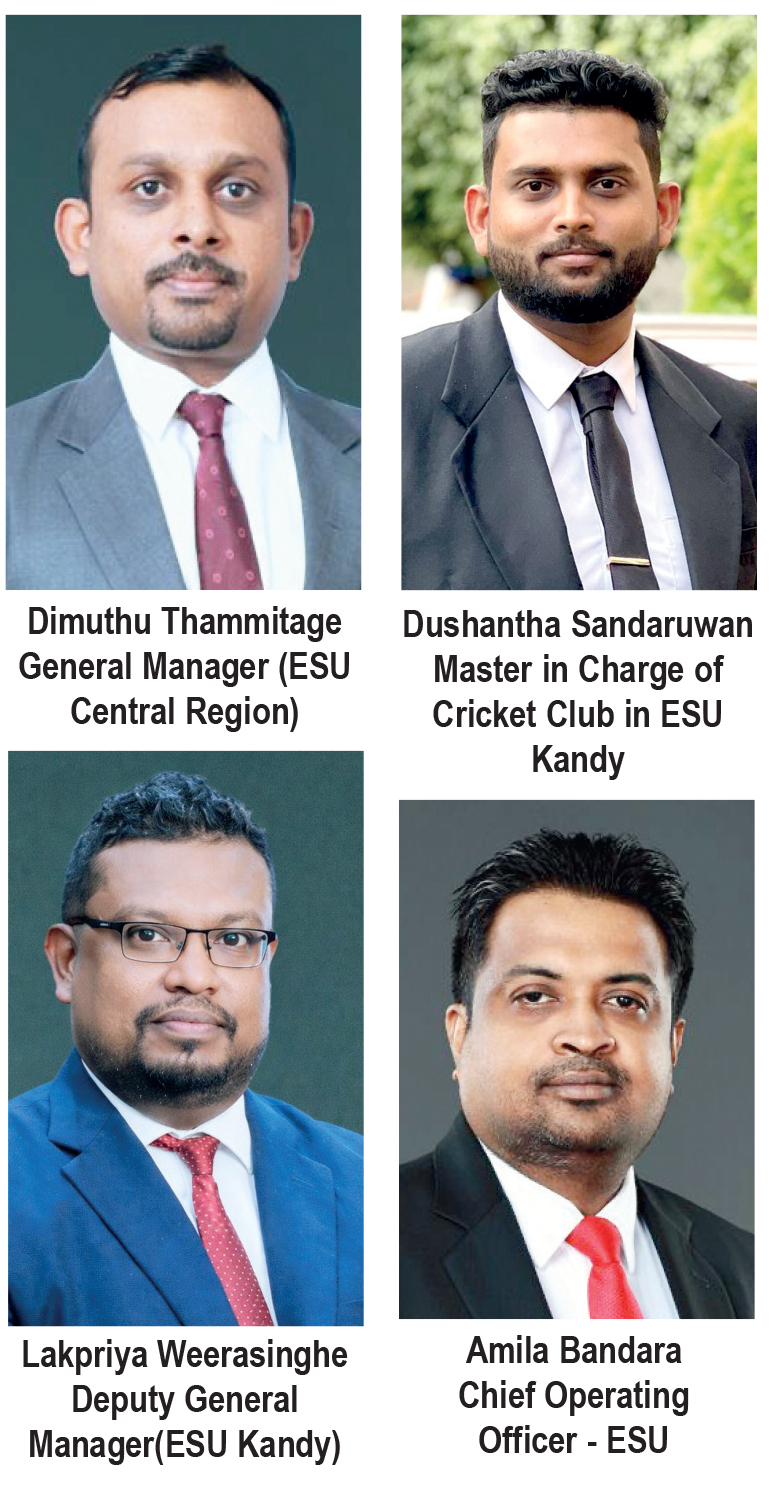
Team Lineups
ESOFT Uni Kandy (Winners)
Chamath Ekanayake (Captain), Dinuka Tennakoon (Vice Captain), Dushantha Sandaruwan (MIC), Chalitha Rathnayake, Pulasthi Bandara, Isuru Dehigama, Kesara Nuragoda, Aadhil Sherif, Isuru Pannala, Achintha Medawatta, Ahamed Shukri, Gowtham Hari Dharshan, Danushka Sahan, Eranda Bandara, and Damith Dissanayake.
ESOFT Metro Campus Kurunegala (Runners-up)
Adeesha Samarasekara, Savishan Madusha, Lahiru Diyalagoda, Hirun Damayantha, Naveen Madushanka, Daham Pothuwewa, Senuda Thewnaka, M.R. Abdulla, Arunodya Dasun, Mohamad Afri, Desith Perera, Lasitha Ranawaka, Anton Dilon, Shenuka Thirantha, and Kavindu Bandara.
Text and Pix By S.K. Samaranayake
Business
HNB joins Royal–Thomian “Battle of the Blues” as official banking partner

HNB PLC, Sri Lanka’s leading private sector bank, has joined as the Official Banking Partner for the 147th edition of the historic “Battle of the Blues,” the Royal–Thomian cricket encounter between Royal College, Colombo, and S. Thomas’ College, Mt. Lavinia. Commenting on the partnership, HNB’s Managing Director/CEO Damith Pallewatte highlighted the bank’s long-standing connection with cricket, including sponsorship of Sri Lanka’s first Test match against England in 1982, and emphasized HNB’s commitment to nurturing young talent and promoting school cricket. The three-day clash for the Rt. Hon. D. S. Senanayake Memorial Shield will take place from March 12–14 at the SSC Grounds, with the Mustangs Trophy one-day match following on March 28 under lights. HNB’s inaugural involvement marks a milestone in the bank’s sports marketing journey, strengthening its role in the school cricket ecosystem. The bank will enhance the spectator experience by introducing digital and cashless banking solutions, modernizing the event while preserving its rich heritage and sporting tradition.
-

 Business6 days ago
Business6 days agoMinistry of Brands to launch Sri Lanka’s first off-price retail destination
-

 Features11 hours ago
Features11 hours agoWhy does the state threaten Its people with yet another anti-terror law?
-

 Latest News2 days ago
Latest News2 days agoNew Zealand meet familiar opponents Pakistan at spin-friendly Premadasa
-

 Latest News2 days ago
Latest News2 days agoTariffs ruling is major blow to Trump’s second-term agenda
-

 Latest News2 days ago
Latest News2 days agoECB push back at Pakistan ‘shadow-ban’ reports ahead of Hundred auction
-

 Features6 days ago
Features6 days agoGiants in our backyard: Why Sri Lanka’s Blue Whales matter to the world
-

 Sports3 days ago
Sports3 days agoOld and new at the SSC, just like Pakistan
-

 News2 days ago
News2 days agoConstruction begins on country’s largest solar power project in Hambantota


